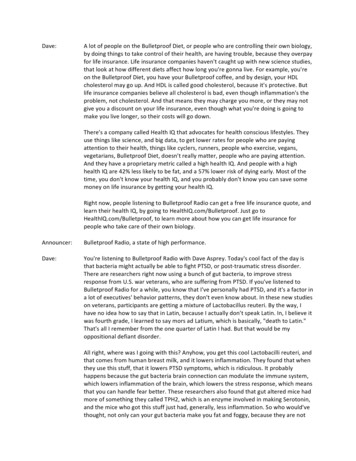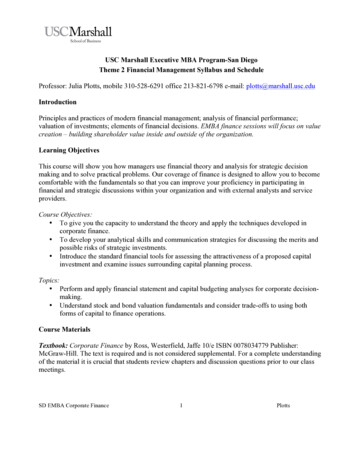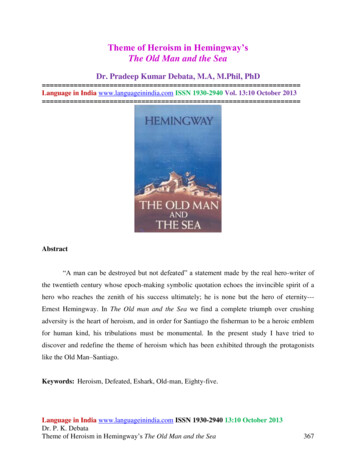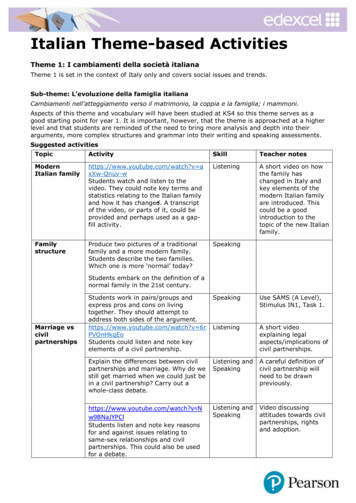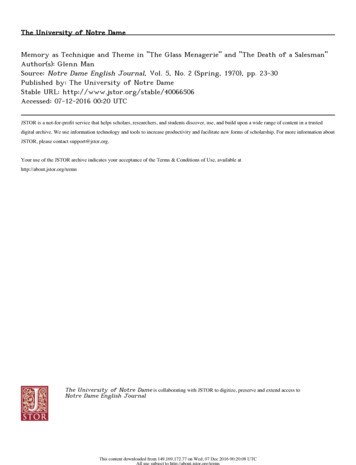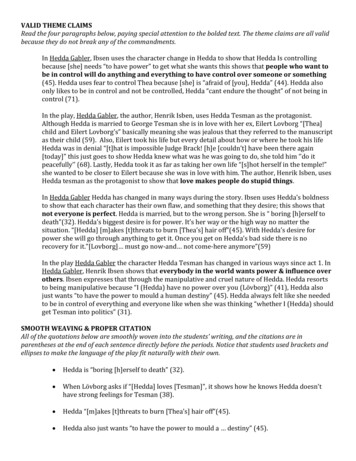
Transcription
VALID THEME CLAIMSRead the four paragraphs below, paying special attention to the bolded text. The theme claims are all validbecause they do not break any of the commandments.In Hedda Gabler, Ibsen uses the character change in Hedda to show that Hedda Is controllingbecause [she] needs “to have power” to get what she wants this shows that people who want tobe in control will do anything and everything to have control over someone or something(45). Hedda uses fear to control Thea because [she] is “afraid of [you], Hedda” (44). Hedda alsoonly likes to be in control and not be controlled, Hedda “cant endure the thought” of not being incontrol (71).In the play, Hedda Gabler, the author, Henrik Isben, uses Hedda Tesman as the protagonist.Although Hedda is married to George Tesman she is in love with her ex, Eilert Lovborg “[Thea]child and Eilert Lovborg’s” basically meaning she was jealous that they referred to the manuscriptas their child (59). Also, Eilert took his life but every detail about how or where he took his lifeHedda was in denial “[t]hat is impossible Judge Brack! [h]e [couldn’t] have been there again[today]” this just goes to show Hedda knew what was he was going to do, she told him ‘’do itpeacefully’’ (68). Lastly, Hedda took it as far as taking her own life “[s]hot herself in the temple!”she wanted to be closer to Eilert because she was in love with him. The author, Henrik Isben, usesHedda tesman as the protagonist to show that love makes people do stupid things.In Hedda Gabler Hedda has changed in many ways during the story. Ibsen uses Hedda’s boldnessto show that each character has their own flaw, and something that they desire; this shows thatnot everyone is perfect. Hedda is married, but to the wrong person. She is “ boring [h]erself todeath”(32). Hedda’s biggest desire is for power. It’s her way or the high way no matter thesituation. “[Hedda] [m]akes [t]threats to burn [Thea’s] hair off”(45). With Hedda’s desire forpower she will go through anything to get it. Once you get on Hedda’s bad side there is norecovery for it.”[Lovborg] must go now-and not come-here anymore”(59)In the play Hedda Gabler the character Hedda Tesman has changed in various ways since act 1. InHedda Gabler, Henrik Ibsen shows that everybody in the world wants power & influence overothers. Ibsen expresses that through the manipulative and cruel nature of Hedda. Hedda resortsto being manipulative because “I (Hedda) have no power over you (Lövborg)” (41), Hedda alsojust wants “to have the power to mould a human destiny” (45). Hedda always felt like she neededto be in control of everything and everyone like when she was thinking “whether I (Hedda) shouldget Tesman into politics” (31).SMOOTH WEAVING & PROPER CITATIONAll of the quotations below are smoothly woven into the students’ writing, and the citations are inparentheses at the end of each sentence directly before the periods. Notice that students used brackets andellipses to make the language of the play fit naturally with their own. Hedda is “boring [h]erself to death” (32). When Lövborg asks if “[Hedda] loves [Tesman]”, it shows how he knows Hedda doesn’thave strong feelings for Tesman (38). Hedda “[m]akes [t]threats to burn [Thea’s] hair off”(45). Hedda also just wants “to have the power to mould a destiny” (45).
Name:Date:Period:Thematic Analysis Task – Peer Revision (Part One)Commandment #1 Broken: NO PLOTRead the paragraph below, paying special attention to the bolded text. The theme claim is invalid becausethe student includes plot in the claim. Rewrite the sentence in which the claim appears so that thiscommandment isn’t broken. Highlight the revised theme claim.The Character Hedda Tesmen from the play Hedda Gabler has changed in many ways since thebeginning of the story. In Hedda Gabler; Ibsen uses Hedda’s cruelness to suggest that everycharacter has a desire for power and influence in the story. Hedda just wants “for once in[her] life to have power to [mold] a human destiny” (45). She also tries to make people feel scaredof her; almost trying to get a feeling of being the “Alpha Male”. She threatens to “burn [Thea’s] hairoff,” (45). Even though Thea “would rather go home alone! At once!” (45) Hedda holds Thea in herarms refusing to let her go home. Hedda has the biggest desire for power, showing that she will doalmost anything to achieve it throughout the story. Even though everyone treats Hedda like she isa queen, she feels she is “Poor” (45) and that “fate has made [Thea] so rich!”(45).Commandment #2 Broken: COMPLETE THOUGHTRead the paragraph below, paying special attention to the bolded text. The theme claim is invalid becausethe student has not phrased the claims as a complete thought. Rewrite the sentence in which the claimappears so that this commandment isn’t broken. Highlight the revised theme claim.Throughout the story, Eilert Lovborg continuously changes so that the idea of humans beingmanipulated develops. Eilert constantly gets stuck between Thea and Hedda, and they alwaysseem to have some sort of power over him. The motif of this particular paragraph is Hedda’sdriving force in Eilert’s back and forth actions. Eilert was trying to be a good man who focused onhis studies for Thea, but then Hedda was brought back to him, and she liked him when he was analcoholic. Throughout the story, Lovborg continuously changed because of the idea of humansbeing manipulated.
Commandment #3 Broken: SPECIFIC LANGUAGERead the paragraph below, paying special attention to the bolded text. The theme claim is invalid becausethe student’s language is awkwardly phrased and unclear. Rewrite the sentence in which the claim appearsso that this commandment isn’t broken. Highlight the revised theme claim.Hedda Gabler from Henrik Ibsen Novel has changed in many ways since Act 1. Hedda proves thatPatriarchy and Close mindedness can be manipulated under any set of “living rules”; Heddadoesn’t care for “only firing [a pistol] in the air” (25) she has no need for any disturbance or helpfrom a male. Manipulation may only be enough “If [She] could get [Tesman] into [politials] all thesame?”(31) Hedda won’t back down for no one’s opinion not even Bracks question of “ Generality of women[s] turn for duties” (32). Hedda has the biggest problem with the thought ofpatriarchy; a man question her and she probably “won’t talk to you” (37). Regardless of who youare to her Hedda uses things for “[her] own sake” (41) throughout Ibsen book even though it maylook as if it was for the goods of others.Commandment #4 Broken: NO “I”, “YOU”Read the paragraph below, paying special attention to the bolded text. The theme claim is invalid becausethe student includes first or second person pronouns in the claim. Rewrite the sentence in which the claimappears so that this commandment isn’t broken. Highlight the revised theme claim.In Hedda Gabler, Ibsen uses Lövborg’s desire to write a successful book to imply that beingcompetitive could benefit or go against you. For example, Lövborg says people should “spare[themselves] the trouble” when referring to the manuscript (34). This goes to show howcompetitive Tesman and Lövborg are towards each other. Lövborg also has power and influenceover Tesman because of the way Tesman looks up to him. Earlier in the play Tesman refers toLövborg’s writing as “remarkable soundness of judgement (29).” This goes to show the influenceLövborg has over Tesman as well as how Tesman wants to fill in his position. While this wholeconflict develops Ibsen is trying to convey how even when in “love” people can still betray you.When Lövborg asked if “[Hedda] loves [Tesman]” it shows how he knows Hedda doesn’t havestrong feelings for Tesman (38). This interaction goes to show more of how the two men arecompetitive. This competitive nature will eventually back fire for one man and be beneficial for theother man.
Name:Date:Period:Thematic Analysis Task – Peer Revision (Part Two)Which theme claim commandment is broken here?Read the paragraph below, paying special attention to the bolded text. The theme claim is invalid because itviolates one of the commandments. Using you theme claim notes, determine which commandment itviolates; then, rewrite the sentence in which the claim appears so that no commandments are broken.Highlight the revised theme claim.Hedda Tesmen from the book Hedda Gabler by Henrik Ibsen portrays many different emotionsthroughout this book. Her mood changed vastly from the beginning to the end, developing acommon theme of manipulation that people will do just to gain power in the world. Heddaespecially, manipulates those around her just so then she can “have power to [mold] a humandestiny” (45). She causes this fiasco of manipulation and controversy by simply making thosearound her believe in which she is above them and that they should be scared of her. Even shenotices that “these impulses come over [her] all of the sudden and [she] can’t resist them” Act 2.She tends to play a game of he-said-she-said with her close acquaintances, causing for muchcorruption by “everything [she] touch[es] seems destined to turn into something mean andfaricial” Act 4. She uses this and continues to show that people will attempt to gain power to usethe people around them as stepping stones, to seizing new opportunities, for climbing to the top.Fixing Weaving and Citing ErrorsRead the each of the five paragraph excerpts below, paying special attention to the textual support. All of thequotations below are improperly woven and/or improperly cited. Use the guidelines on the QuotationWeaving & Citation Guide and your copy of the play to revise and edit each excerpt so that all of thequotations are properly woven and cited. In the book it states “{Hedda} I don’t care about it,” (8) that shows some of themanipulating things Hedda does to get inside their head.
The quotation “you are not really happy.” (page 30) shows that Hedda only reveals whatshe wants, to everyone else her and Mr. Tesman are the perfect couple, they’re wealthy andseem to be truly in love, but; that isn’t exactly the case. She {Hedda} is a symbol of fire she can be good and bad like fire. In Act III she says, “I agreewith you,” (55) this is great because she manipulates people and lies to them. Hedda, after hearing Eilert Lövborg had lost his manuscript, lies about having it and learnshe is suicidal. She gives him one of her pistols and says “will you not try to-to do itbeautifully”(59). Hedda refers to the pistol as a momento. Hedda doesn’t think death is a bad thing. SendingEilert away with a gun saying “and beautifully, Eilert Lövborg promise me that!”,encouraging him to google through with ending it all “beautifully”.
Highlight the revised theme claim. Hedda Gabler from Henrik Ibsen Novel has changed in many ways since Act 1. Hedda proves that Patriarchy and Close mindedness can be manipulated under any set of “living rules”; Hedda doesn’t care for “only firing [a pistol] in the air” ( w) she has no need for any disturbance or help from a male. Manipulation may only be enough “If [She] could get [Tesman] into

